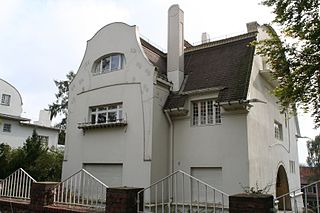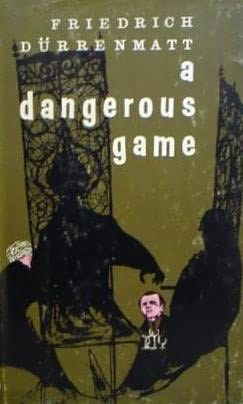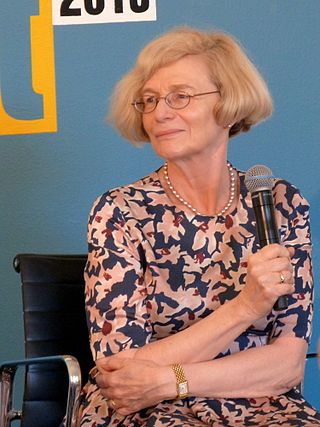
German literature comprises those literary texts written in the German language. This includes literature written in Germany, Austria, the German parts of Switzerland and Belgium, Liechtenstein, Luxembourg, South Tyrol in Italy and to a lesser extent works of the German diaspora. German literature of the modern period is mostly in Standard German, but there are some currents of literature influenced to a greater or lesser degree by dialects.

Friedrich Dürrenmatt was a Swiss author and dramatist. He was a proponent of epic theatre whose plays reflected the recent experiences of World War II. The politically active author's work included avant-garde dramas, philosophical crime novels, and macabre satire. Dürrenmatt was a member of the Gruppe Olten, a group of left-wing Swiss writers who convened regularly at a restaurant in the city of Olten.

Patricia Highsmith was an American novelist and short story writer widely known for her psychological thrillers, including her series of five novels featuring the character Tom Ripley. She wrote 22 novels and numerous short stories throughout her career spanning nearly five decades, and her work has led to more than two dozen film adaptations. Her writing derived influence from existentialist literature, and questioned notions of identity and popular morality. She was dubbed "the poet of apprehension" by novelist Graham Greene.
Georges Poulet was a Belgian literary critic associated with the Geneva School. Best known for his four-volume work Studies in Human Time, Poulet rejected formalist approaches to literary criticism and advanced the theory that criticism requires the reader to open his or her mind to the consciousness of the author. His work has had a lasting influence on critics such as J. Hillis Miller.

Friedrich Glauser was a German-language Swiss writer.

The Swiss National Library is the national library of Switzerland. Part of the Federal Office of Culture, it is charged with collecting, cataloging and conserving information in all fields, disciplines, and media connected with Switzerland, as well as ensuring the widest possible accessibility and dissemination of such data.
Hermann Burger was a Swiss poet, novelist and essayist. In his creative works Burger often focused on society's lonely outsiders and, increasingly, the inevitability of death. His virtuosity in applying literary styles and use of thorough research are significant features of many of his publications.

Hugo Loetscher was a Swiss writer and essayist.

The Deutsche Akademie für Sprache und Dichtung was founded on 28 August 1949, on the 200th birthday of Johann Wolfgang von Goethe, in the Paulskirche in Frankfurt. It is seated in Darmstadt, since 1971 in the Glückert House at the Darmstadt Artists' Colony. It is a society of writers and scholars on matters pertaining to German language and literature in the Deutsche sprachraum, or Germanosphere.

Kurt Marti was a Swiss theologian and poet. His poetry often has theological and religious aspects to it. He is also known for dialect literature said to have intellectual quality.

Anneke Brassinga is a Dutch writer and translator. She was awarded the Constantijn Huygens Prize in 2008, and has received numerous other prizes as well.

Ventseslav Konstantinov was a Bulgarian writer, aphorist and translator of German and English literature.

A Dangerous Game is a 1956 novel by the Swiss writer Friedrich Dürrenmatt. Its original German title is Die Panne, which means "The breakdown". It is known as Traps in the United States. It tells the story of a traveller who, when his car breaks down, is invited for dinner by a former judge, after which nightmarish developments follow. The work was initially written as a radio play, but was adapted into prose almost immediately. It won the 1956 Blind War Veterans’ Prize for best radio play and the literary award of the newspaper Tribune de Lausanne.
Oleksiy Logvynenko was a Ukrainian translator who specialized in translating from German and English.
The Diogenes Verlag is a Swiss publisher in Zurich, founded in 1952 by Daniel Keel, with a focus on literature, plays and cartoons. It has been managed since 2012 by the founder's son, Philipp Keel. It is the largest independent literary publisher in Europe.
Heinz Ludwig Arnold was a German literary journalist and publisher. He was also a leading advocate for contemporary literature.

The Centre Dürrenmatt Neuchâtel (CDN) exhibits Friedrich Dürrenmatt's paintings and drawings. It is a part of Swiss National Library, just like Swiss Literary Archives, which has a close cooperation with CDN.
The Schiller Prize was a Swiss literary award which was established in 1905 to promote Swiss literature and was awarded until 2012 when it was replaced as a national literary award by the Swiss Literature Awards.

Deborah Judith Vietor-Engländer is a British literary scholar.
This page is based on this
Wikipedia article Text is available under the
CC BY-SA 4.0 license; additional terms may apply.
Images, videos and audio are available under their respective licenses.














